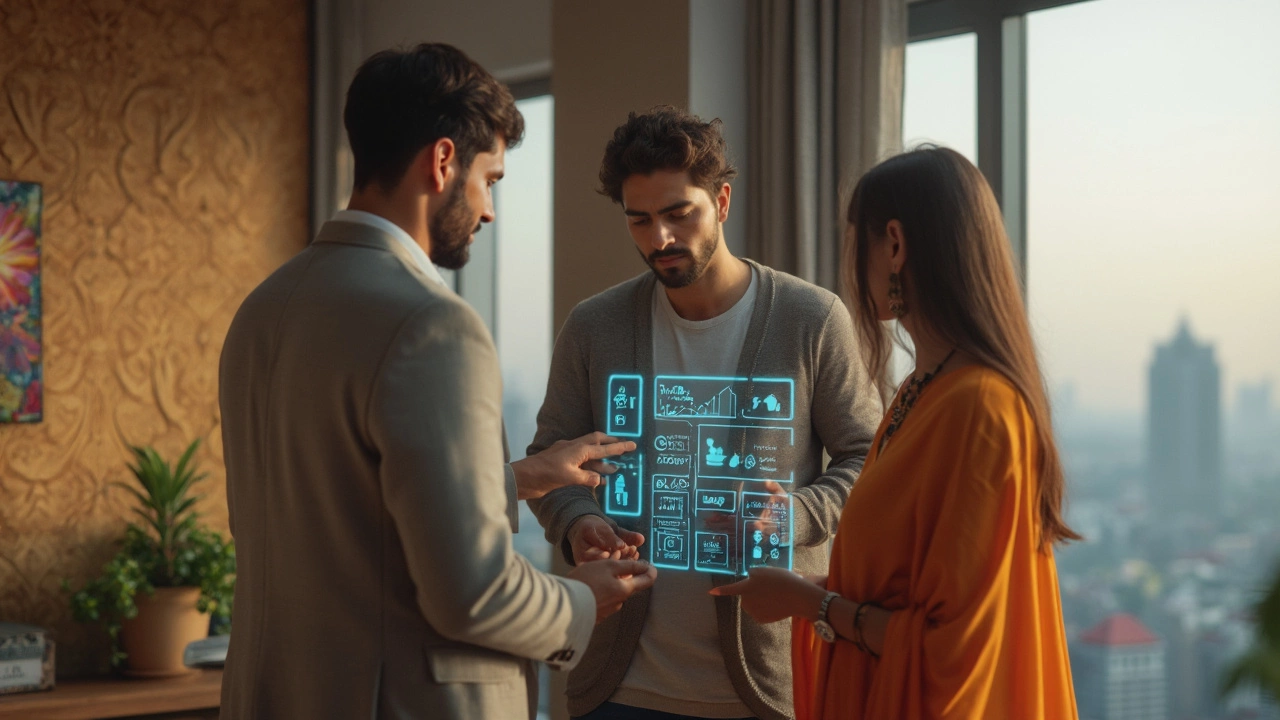
Ask any real estate agent these days, and they’ll tell you—buyers pay attention to the tech in your house. But do smart home upgrades actually bump up your property value, or are they just a fun way to make life a bit easier? Let’s cut through the noise and see what’s really worth your money.
It’s not about stuffing your home with the latest gadgets. Buyers don’t care if you’ve got a talking fridge or a robot that can fetch slippers. They want simplicity, convenience, and security—those are the smart features that really catch their eye. Everything else is just extra.
If you’re thinking about selling or just want to make your house stand out, knowing which smart devices make a difference can help you spend smartly. A basic smart thermostat? People love those. Whole-home security system you can control from your phone? That’s a game-changer for a lot of buyers, especially families. The trick is to focus on stuff that’s easy to use and saves money, not just cool new toys.
- What Counts as a Smart Home?
- How Smart Tech Affects Value
- Smart Upgrades That Matter Most
- Getting the Best Return on Investment
What Counts as a Smart Home?
The term smart home gets thrown around a lot, but what does it really mean for your place? At the basic level, a smart home just means you’ve got tech set up to give you more control, convenience, or savings—usually through your phone or voice. You don’t need to turn your house into a sci-fi movie, but you do need a solid mix of smart features that actually make life easier.
Here’s what usually counts as a smart home when buyers or real estate agents talk about it:
- Smart thermostats: Control heating and cooling with your phone (think Nest or Ecobee). These usually save money on energy bills, which buyers remember.
- Security systems: Cameras, smart locks, alarms you manage from your phone or tablet. Big peace of mind points here.
- Smart lighting: Bulbs or switches you schedule or control with an app—super handy for energy savings or setting the right mood.
- Voice assistants: Speakers like Alexa or Google Home that can run routines or answer questions—these serve as remote controls for the whole setup.
- Connected appliances: Fridges, ovens, washers, or robot vacuums that work with your phone or smart assistant. Neat, but not make-or-break for buyers.
You don’t need every single item above. But, the more core systems (like security and climate control) that are automated or remotely controlled, the higher your place may rank in the eyes of real estate pros and buyers.
Here’s a quick comparison of what counts as entry-level and fully equipped smart homes:
| Home Type | Key Smart Features |
|---|---|
| Entry-Level Smart Home | Smart thermostat, basic smart lighting, voice assistant |
| Full Smart Home | Security cameras, smart locks, climate, lighting, smart appliances |
The good news? You don’t have to go all-out. Just a few targeted smart home upgrades can put your home ahead of most. Think about where your house needs a little extra convenience or efficiency, and start there. Buyers care more about a few well-chosen upgrades that actually make their daily lives easier than a pile of fancy features they won’t use.
How Smart Tech Affects Value
So, does tossing some smart home gear into your place really change your bottom line when it’s time to sell? The short answer: yes, but not all gadgets are created equal. Homebuyers are looking for tech that seriously improves daily life, like saving on bills, making things safer, or making basic routines smoother. If buyers can see a real, practical upside, that’s when you’ll see value go up.
According to a 2023 survey by Coldwell Banker, about 70% of potential buyers say they prefer homes with smart home features already set up. They’re not talking about just plugs or speakers—they mean real improvements. For example, smart thermostats can cut heating and cooling costs, sometimes by as much as 10-12% a year. When folks know they’ll save money, they’re happy to pay a little more upfront.
| Smart Device | Estimated Value Impact |
|---|---|
| Smart Thermostat | ~$1,200 added value |
| Smart Security System | Up to 5% bump on final price |
| Smart Lighting | Minimal, mainly improves appeal |
But it’s not always about more stuff. A tangle of random, complicated gadgets can actually turn buyers off if they look like a hassle. The key is a system that’s easy to control—think of setups you can adjust from a single app. And don’t forget: some buyers get nervous about smart home privacy, especially with cameras and microphones. Make sure your gear is up to date and comes with clear privacy controls.
If you’re aiming to raise property value, don’t waste cash on gimmicks. Stick to reliable smart home products that are easy to operate, save energy, or boost security. These are the changes that show real results when you list your home.

Smart Upgrades That Matter Most
When it comes to getting real bang for your buck, not all smart home gadgets are created equal. Some actually raise your property value and catch buyers’ eyes, while others just collect dust. Let’s break down which upgrades move the needle the most.
Smart thermostats pop up at the top of almost every home improvement list. They’re affordable, easy to install, and everyone loves the idea of cutting energy bills. According to research from the National Association of Realtors, 77% of buyers consider programmable thermostats a selling point. Simple models like Nest or Ecobee do the job and don’t overcomplicate things.
If you want to step it up, a smart security system is the next move. Cameras, alarms, and video doorbells you can check on your phone make potential buyers feel instantly safer. Plus, studies from SafeWise show homes with smart security attract more interest and even sell a bit faster in tech-savvy neighborhoods.
Smart lighting is another solid bet. Swapping your light switches for smart versions lets people control lights from anywhere—and that’s a feature young buyers expect. These upgrades aren’t just about showing off. If a walkthrough is at night, being able to light things up by voice or app actually helps your home look its best.
Let’s look at a quick comparison of what matters most versus what doesn’t. Flashy, high-end audio systems or smart fridges might seem cool, but they rarely change what someone is willing to pay for your place.
| Smart Upgrade | Boosts Value? | Why/Why Not |
|---|---|---|
| Smart Thermostat | Yes | Saves money and energy, easy to use |
| Smart Security | Yes | Increases safety, gives peace of mind |
| Smart Lighting | Yes | Adds convenience, modern look |
| Smart Fridge | No | Seen as luxury, not practical for most |
| High-end Smart Speakers | No | Personal preference, rarely moves value |
If you only buy one upgrade, pick a smart thermostat. If you’re going for two or three, add security and lighting. Skip the over-the-top stuff unless you really just want it for yourself. Keeping it simple pays off when you sell.
Getting the Best Return on Investment
If you’re thinking about installing smart home tech just to boost your property value, the key is picking upgrades that actually matter to buyers—and not going overboard. The truth is, not everything labeled “smart” pays off when you sell your house. Some stuff is just for show, and buyers know it.
A recent survey from the National Association of Realtors found that homes with built-in smart devices like thermostats and security cameras tend to sell faster, and sometimes at a premium—typically between 3% to 5% higher than similar homes without them. The basics, like a smart thermostat or a video doorbell, can even pay for themselves when it's time to negotiate price.
Here’s what actually gives you the best bang for your buck:
- Smart thermostat: Low upfront cost, helps with energy bills, and most buyers recognize its value right away.
- Video doorbell or smart locks: Easy to install and gives a clear security benefit. Families and first-time buyers especially love these.
- Home security systems you can monitor from your phone: Peace of mind is big money in real estate. Systems like Ring and SimpliSafe get buyers’ attention.
- Smart lighting: Not as flashy as a voice assistant, but lets buyers control energy use and security with a tap.
But here’s an insider tip: keep it simple. Complicated setups can scare buyers off, especially if they think they’ll need a PhD just to turn off the lights. Opt for systems that work with popular platforms like Google Home, Alexa, or Apple HomeKit, so it’s easy for buyers to plug and play.
Also, don’t feel pressure to smarten every inch of your home. The National Association of Home Builders reports that most buyers would rather see a handful of well-chosen upgrades than a jumble of random gadgets.
“Smart tech that solves an actual problem—saves energy, keeps the house secure, or just makes daily life easier—almost always helps make a house more marketable,” says real estate expert Jonathan Miller.
One more thing: document your upgrades. Keep receipts and quick instruction guides handy so buyers know exactly what they’re getting. Some homeowners even get a small bump in price just by listing all their home automation features clearly in the property description.
| Device | Estimated Cost | ROI (Resale Value Bump) |
|---|---|---|
| Smart Thermostat | $100-$250 | ~$500 |
| Video Doorbell | $80-$200 | ~$500 |
| Full Home Security | $300-$1,000 | Up to 3-5% of sale price |
At the end of the day, sticking to these tried-and-true smart home upgrades means less stress, less wasted cash, and a serious step up when it comes time to sell.